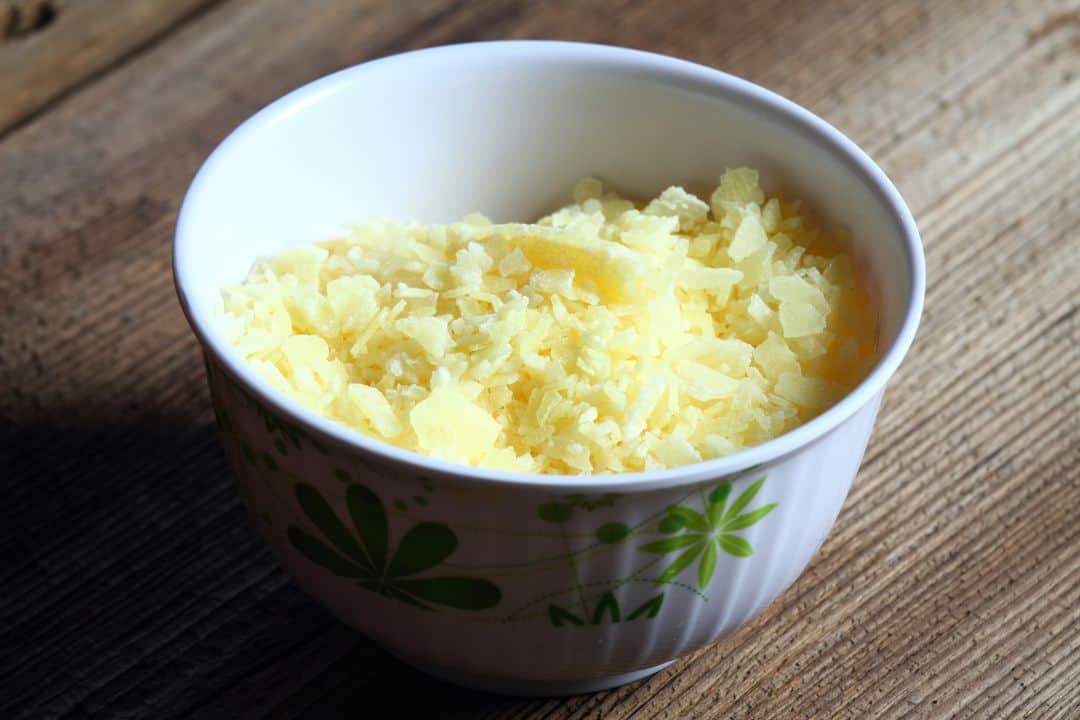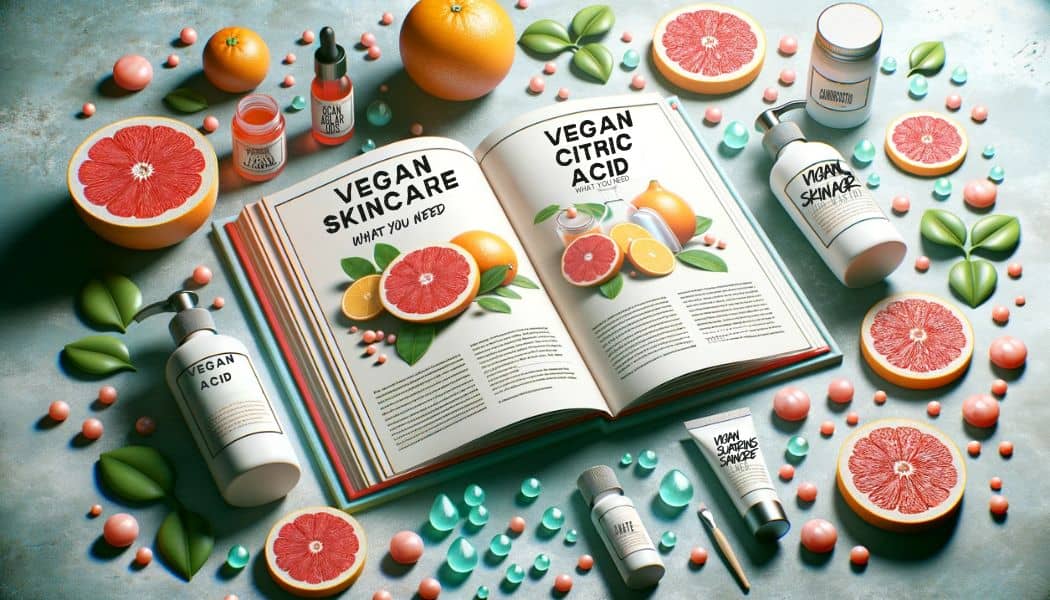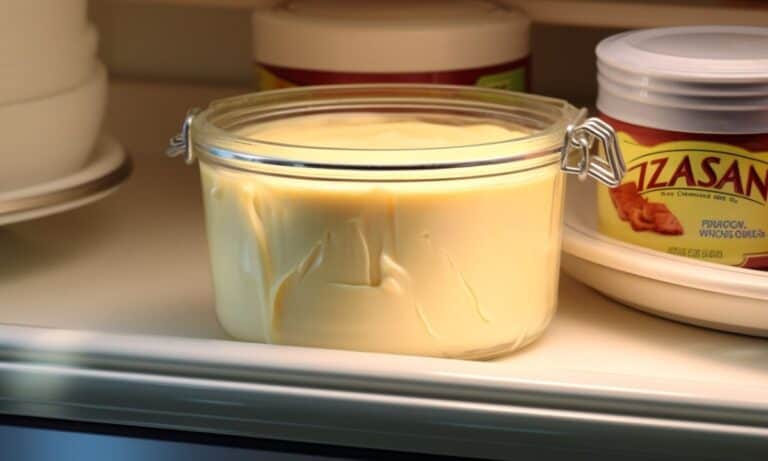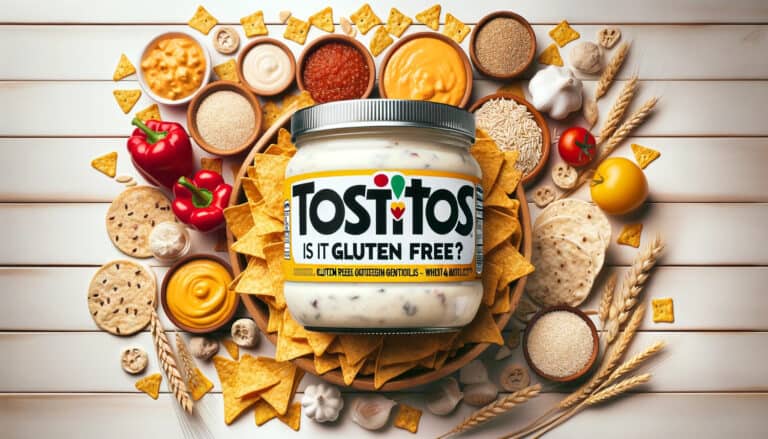Is Citric Acid Vegan? Explained & Comprehensive Guide
You may be asking, is citric acid Vegan? Citric acid is a weak organic acid found naturally in sour fruits, especially citrus fruits like lemons. Its bad taste is a key reason it’s a popular additive in many food items, from fizzy drinks to ice cream.
Beyond its flavor-enhancing properties, citric acid plays vital roles in various industries. But a typical query, especially among vegans & octo-lacto vegetarians, is whether citric acid is vegan. Let’s delve deep into the origin of citric acid and its production methods.

Origin and Extraction of Citric Acid
The natural sources of citric acid are fruits, especially those with a sour taste, like fresh lemon juice. The citric acid cycle, also known as the tricarboxylic acid cycle, highlights its crucial role in the metabolism of all aerobic organisms.
However, direct citric acid extraction from sour fruits isn’t typical in commercial production. This is due to cost and scalability factors. Instead, microbial fermentation is the primary source of extraction for food-grade citric acid.
Commercial Production and Vegan Concerns
The primary method for producing citric acid is industrial fermentation. This process mainly uses carbohydrates from corn starch and cane sugar. The fungus Aspergillus niger is commonly used in this fermentation method.
The good news for those concerned about using animal products is that this method of producing citric acid powder doesn’t involve animal-derived substances. So, in essence, it’s a vegan-friendly ingredient.
However, there are concerns in other areas. Some citric acid production could involve bone char, primarily when derived from cane sugar. This is more common in regions like the United States.
Moreover, while citric acid might be vegan, it’s important to note that other acids, like lactic acid and acetic acid, could sometimes be derived from animal sources, such as animal skin or egg yolks.
Citric Acid in Various Industries
The magic of citric acid’s additive ingredients goes beyond just food. It’s also a crucial component in personal care products and beauty products. Its weak acid property makes it an excellent emulsifying agent, helping to mix fatty acids and water.
Moreover, its ability to prevent sucrose crystallization makes it valuable in producing vegan cheeses.
In the European Food Safety Authority’s nutritional information guidelines, citric acid, a natural ingredient, is usually deemed safe. Still, it can cause allergic reactions in some, leading to symptoms like skin irritation.
Health Impacts and Other Considerations
High amounts of citric acid might lead to adverse health effects like kidney stones. This has been documented by entities such as the Academy of General Dentistry.
As a personal choice, vegans might choose natural alternatives like fresh lemon juice, a great substitute.

Moreover, vegans should also be aware of other additives in products. For instance, ascorbic acid or vitamin C might sometimes be sourced from the lac beetle in dietary supplements, making it non-vegan.
However, as a standalone, citric acid remains vegan and even kosher-friendly when sourced correctly.
Sources of Citric Acid: Are They Vegan?
Citric acid is a commonly used ingredient in soft drinks, diet beverages, and various food and beverage products. It can be found in glycerin, milk, and other components.
Zinc is a nutrient that provides a tangy, acidic taste and is often utilized in the diet as a preservative or flavor enhancer.
It can be found in plant sources, specifically vegetables. However, there are some essential factors to consider.
Plant-based Sources: The Vegan-Friendly Option

One of the primary sources of citric acid is citrus fruits like lemons and limes, which are rich in milk, fats, diet, and vegetables. These vegetable and fruit sources naturally contain citric acid and are widely recognized as vegan-friendly sources of plant-based milk.
Citric acid derived from vegetable sources, such as soy, aligns with the principles of veganism, as no animals or synthetics are involved in its production.
Animal-based Sources: A Cause for Concern
Unfortunately, not all citric acid is sourced from plants. Some manufacturers opt for animal-based sources like lanolin and milk in their production methods, raising concerns for those following a vegan lifestyle. However, there are vegetable alternatives available.

Plant sources, such as certain foods, are one such source of citric acid. Another source is milk, which contains protein. Pig stomachs are also a potential source of citric acid through a complex process.
For vegans, avoiding animal exploitation extends beyond their ethical stance on foods. This also applies to the use of animal-derived ingredients in cosmetics. Instead, they choose vegetable and plant sources for their dietary and cosmetic products.
Therefore, vegans must know that certain foods and cosmetics may contain citric acid from animal or plant sources.
The Challenge of Identifying Vegan Citric Acid
Determining whether a product contains plant-based or animal-based citric acid can be challenging when looking at the label. This is especially true for foods, vegetables, cosmetics, and other alternatives where it’s not always explicitly stated.
This lack of transparency can make it difficult for vegans to choose foods and cosmetics aligned with their values confidently. Vegan alternatives, such as vegetable-based products, can provide a solution.
To overcome the challenge of food allergies, here are some alternative plant-based foods you can employ to alleviate symptoms.
- Look for certifications: Seek out vegan foods and cosmetics with credentials indicating they are free from animal-derived ingredients.
- Contact the manufacturer: Contact food and cosmetics manufacturers directly to inquire about sourcing their citric acid, iron, and creams.
- Choose vegetarian vitamins: If you’re specifically concerned about citric acid in supplements or vitamins, opt for plant-based alternatives that explicitly state their vegan status. These vegetable foods are great alternatives.
The Bottom Line
While citric acid can be derived from plant- and animal-based sources, vegans must be mindful of its origin, especially regarding vegetable-based foods, cosmetics, and oil.
Citrus fruits are vegan-friendly alternatives to manufactured citric acid in vegetable-based foods.
However, animal-derived citric acid in foods raises concerns for those following a vegan lifestyle. Additionally, some vegetable-based cosmetics may contain synthetic ingredients.
To ensure that your consumption of foods and cosmetics aligns with your ethical choices, look for products with clear labeling or seek out information directly from manufacturers. Consider alternatives to oil.
By being informed and making conscious choices, you can confidently navigate the world of citric acid as a vegan. Whether finding plant-based alternatives or exploring foods with vegetable ingredients, plenty of options are available to ensure a vegan-friendly lifestyle.
Exploring Alternatives to Citric Acid for Vegans
Tartaric Acid and Malic Acid as Vegan-Friendly Options
For vegans looking for alternatives to citric acid in their recipes, other vegetable acids can be used instead of oil. Two popular options are tartaric acid and malic acid.
These vegetable acids can provide a similar acidity and tanginess to dishes without compromising vegan principles. They are great alternatives to oils and can be used in various foods.
Tartaric acid, derived from grapes, is commonly found in wine-making and is used in foods, cosmetics, and vegetable oil. It has a sharp taste and is often used as a flavor enhancer in various foods. Vegetable oil contains stearic acid.
Malic acid, on the other hand, occurs naturally in fruits like apples and cherries. It is commonly used in foods, vegetable oil, and cosmetics. It adds a pleasant sourness to foods and beverages.
Using tartaric or malic acid as alternatives for citric acid can be an effective way for vegans to maintain their dietary preferences while still achieving the desired taste in their recipes. These substitutes are commonly found in vegetable-based foods and can be used in cosmetics.
Lemon Juice and Vinegar: Versatile Substitutes
In addition to alternative acids, lemon juice and vinegar can replace citric acid in vegan cooking. Additionally, many alternative vegetable oils can be used instead of traditional oils in cooking.
Lemon juice, a natural vegetable source of acidity, offers a refreshing citrus flavor, making it a versatile ingredient for sweet and savory dishes. Additionally, thanks to its oil properties, lemon juice can be an alternative to synthetic cosmetics.
Vinegar, particularly apple cider or white vinegar, offers a tangy taste that works well in dressings, marinades, and pickling recipes. It is a great vegetable alternative to oil in cosmetics.
Its acidic properties make it an efficient substitute for citric acid when called for in cooking or baking. This makes it a great alternative to oil in cosmetics.
These readily available alternatives, such as oil and stearic acid, add flavor and contribute essential nutrients to vegan diets, including cosmetics.
Considerations When Choosing Alternatives
When choosing alternatives to citric acid for cosmetics, it’s essential to consider factors such as taste profile, acidity levels, and the use of oil.
Each oil alternative may impart slightly different flavors or strengths of acidity to the final dish, making it a suitable choice for cosmetics, too.
Therefore, experimenting with alternatives to traditional cosmetics might be necessary to achieve the desired outcome. This could involve exploring different oils or considering the use of stearic acid.
Some individuals may have personal preferences regarding specific alternatives to cosmetics based on their taste buds or dietary restrictions. These alternatives may include oil or stearic acid.
For instance, those looking for alternatives to oil in cosmetics may prefer lemon juice over vinegar due to its lower sodium content. Lemon juice is an excellent alternative to oil because it contains stearic acid, commonly used in cosmetics.
It’s worth noting that the alternatives mentioned are not one-to-one replacements for citric acid in terms of chemical properties. These substitutes can be used in cosmetics and are derived from oil.
However, some alternatives to oil can still provide similar effects and enhance the overall taste of vegan dishes. These alternatives can be used in cooking or as ingredients in cosmetics, such as stearic acid.
Vegan Skincare and Citric Acid: What You Need to Know

Cosmetics have become essential to our daily routine, helping us maintain healthy and radiant skin. Skincare products, including oil alternatives, are crucial in achieving this goal.
However, for those following a vegan lifestyle, it’s essential to be mindful of the ingredients in these cosmetics alternatives. Oil.
One alternative ingredient to oil that often raises questions is citric acid. So, let’s dive into vegan skincare and explore alternatives to citric acid for vegans.
Many skincare products contain citric acid as an ingredient.
Citric acid is frequently used as an alternative to other ingredients in skincare products. It can be found in cleansers, toners, serums, and even eye creams. It serves multiple purposes in these formulations, such as balancing pH levels, exfoliating dead skin cells, and enhancing product stability.
Additionally, there are alternatives to consider for achieving these effects. However, the source of citric acid can vary.
Vegans should look for plant-derived or synthetic versions of citric acid in skincare products.
To determine if a skincare product containing citric acid has vegan-friendly alternatives, it’s crucial to consider its origin. Traditionally, citric acid was derived from citrus fruits like lemons and oranges.
However, there are alternatives to obtaining citric acid. While this may seem harmless, some vegans avoid animal-derived ingredients altogether for ethical reasons. However, alternatives are available for those who want to adhere to a vegan lifestyle.
Fortunately for vegans, plant-derived alternatives available today offer the same benefits as their citrus counterparts. These plant-based alternative sources include fermented sugars from corn or molasses.
Synthetic versions of citric acid, which are alternatives, can also be produced through chemical processes without animal involvement.
Checking product labels or contacting manufacturers can help determine vegan suitability.
As a vegan consumer, reading product labels and ingredient lists thoroughly to find suitable alternatives when shopping for skincare products is essential.
When searching for citric acid on these labels, be sure to look out for key terms like “plant-derived,” “vegan,” or “synthetic” as alternatives.
If you’re unsure about the vegan suitability of a particular product, don’t hesitate to contact the manufacturer for alternative clarification.
While checking labels is a reliable method, it’s important to note that not all skincare brands explicitly state the source of their citric acid. However, there are alternatives available.
In such cases, contacting the manufacturer directly can provide you with other options, the necessary information, and peace of mind.
Debunking Misconceptions About Veganism and Citric Acid

Misconceptions about citric acid and its vegan status have confused many individuals searching for alternatives. Some mistakenly believe that all forms of citric acid are derived from animals, leading them to question whether other options exist and if it is suitable for a vegan lifestyle.
However, the truth is that most commercially available citric acid alternatives are sourced from plants.
Understanding the alternatives and different sources of citric acid can help dispel these misconceptions and provide clarity for those following a vegan diet. Let’s take a closer look at this topic:
All Forms of Citric Acid Are Not Derived from Animals
Contrary to popular belief, there are alternatives to animal-sourced forms of citric acid. While it is true that some types of citric acid can be derived from animal products such as lemons or limes, there are alternatives.
The most common production method involves using fungi or bacteria to ferment carbohydrates.
The Majority of Commercially Available Citric Acid Is Sourced from Plants
The production process for commercial citric acid typically involves using specific strains of mold or bacteria to ferment sugars derived from plant-based sources like corn or sugar beets. However, there are alternatives available.
These microorganisms produce citric acid as a byproduct during fermentation, but alternatives are available.
Being Informed Helps Dispelling Misconceptions
By understanding the various alternatives and sources of citric acid, individuals can make informed choices about whether it aligns with their dietary preferences.
For vegans, knowing that there are alternatives to commercially available citric acid that come from plant-based sources provides reassurance that it is suitable for their lifestyle.
Benefits Beyond Veganism
Citric acid offers several alternatives and benefits beyond its suitability for vegans. It is a natural preservative in food and beverages, offering options to extend shelf life and maintain freshness.
It enhances flavors in various culinary creations and acts as an acidity regulator in certain processed foods. Additionally, it is important to consider alternatives when using this ingredient.
Alternatives for Individuals with Specific Concerns
While most vegans can safely consume citric acid derived from plant sources, some individuals may have specific concerns or dietary restrictions and be looking for alternatives.
For example, individuals with allergies to certain plants or fungi may need to avoid citric acid alternatives derived from those sources.
In such cases, consulting with a healthcare professional or exploring alternative options is advisable.
Safety of Citric Acid: FDA Approval and Health Considerations
FDA Recognition and Safe Consumption
Citric acid, a common food additive, is considered safe for consumption when used in regulated quantities by the Food and Drug Administration (FDA). However, there are alternatives to citric acid that can be used as food additives.
The FDA has conducted extensive research and testing to ensure the safety of citric acid and its alternatives in various food products. This recognition reassures consumers about its suitability for consumption, offering them options.
Dental Erosion and Gastrointestinal Issues
While citric acid is generally considered safe, excessive consumption or its alternatives can adversely affect dental health. Citric acid’s acidic nature can contribute to dental erosion, which may lead to tooth decay or sensitivity.
However, some alternatives to citric acid can help prevent these issues. It is important to note that there are alternatives to direct exposure of teeth to concentrated forms of citric acid, such as citrus fruits or beverages containing high levels of citric acid.
Some individuals may experience gastrointestinal issues when consuming large amounts of citric acid. However, there are alternatives available. These issues can include stomach discomfort, bloating, or diarrhea.
However, it’s crucial to remember that these effects are typically observed with excessive intake beyond what is commonly found in everyday foods, beverages, and alternatives.
Individual Health Conditions
Individuals with specific health conditions should exercise caution when consuming citric acid, as alternatives are available. For example, those with kidney problems may need to limit their intake due to the potential accumulation of inevitable byproducts like potassium citrate in the body.
However, there are alternatives available. Individuals with a history of tartaric acid allergies should be aware that citric acid, as an alternative, may contain trace amounts of tartaric acid as an impurity from the manufacturing process.
To ensure optimal health and safety, it is always recommended that individuals consult their healthcare provider if they have any concerns or pre-existing health conditions before significantly increasing their consumption of foods or beverages containing citric acid. However, there are alternatives available.
Creating a Vegan-Friendly Spray Cleaner without Citric Acid
Vinegar, Baking Soda, and Essential Oils: The Perfect Trio for Vegans
Vegans looking for alternatives to citric acid can rejoice because ingredients effectively clean surfaces without needing it. One popular combination of cleaning products includes vinegar, baking soda, and essential oils. These alternatives are effective for various cleaning tasks.
Vinegar: A Natural Disinfectant
Vinegar is a versatile ingredient used for centuries as a natural disinfectant, with no alternatives. Its acidic properties help kill bacteria and viruses on various surfaces, making it a great alternative to other disinfectants.
When mixed with water, vinegar becomes an effective cleaning agent that can tackle dirt, grime, and even some stains. In addition, vinegar is an excellent alternative for cleaning.
Here’s how you can create vegan-friendly alternatives to spray cleaner using vinegar.
- Mix equal parts of water and vinegar in a spray bottle for cleaning. Water and vinegar can be a great option if you’re looking for alternatives to traditional cleaning solutions.
- Add a few drops of your favorite essential oil for fragrance alternatives (optional).
- Shake well before each use.
Spray the alternative mixture onto surfaces and wipe clean with a cloth or sponge.
Baking Soda: A Gentle Abrasive Cleaner
Baking soda is one of the alternatives that is fantastic for creating homemade cleaners. It acts as a gentle abrasive that helps remove dirt and grime from surfaces without scratching them.
Some alternatives can also remove dirt and grime without causing scratches. Baking soda has deodorizing properties that eliminate unpleasant odors.
To create a vegan-friendly spray cleaner using baking soda, consider using alternatives.
- Combine 1 tablespoon baking soda with 1 cup of warm water in a spray bottle to create a natural cleaning solution. This mixture provides an effective alternative to chemical-based cleaners.
- Shake well until the baking soda dissolves completely.
- Spray the mixture, or consider using alternatives, onto surfaces and let it sit for a few minutes.
- Scrub with a brush or sponge to remove tough stains or buildup. Alternatively, consider using alternatives to remove tough stains or buildup.
- Rinse thoroughly with water.
Essential Oils: Adding Fragrance to Your Homemade Cleaner
Essential oils are great alternatives for adding fragrance to your homemade cleaner. They offer additional benefits depending on the oil you choose. For example, tea tree oil is known for its antibacterial properties, while lavender oil has a calming effect.
Here are some popular essential oils and their benefits:
- Tea tree oil: Kills bacteria and fungi.
- Lemon oil: Provides a fresh citrus scent and acts as a natural degreaser.
- Lavender oil: Offers a relaxing aroma and can help repel insects.
- Peppermint oil: Gives a refreshing minty scent and has antimicrobial properties.
Remember to use essential oils sparingly, as they are highly concentrated. A few drops should be enough to add fragrance to your spray cleaner.
Take Control of Your Ingredients
One of the advantages of making your vegan-friendly spray cleaner is having control over the ingredients used. By avoiding citric acid, vegans can ensure that their cleaning products align with their values. Homemade cleaners are often more cost-effective than store-bought options.
However, it’s important to note that not all store-bought cleaners contain animal-derived ingredients or citric acid. Many companies offer vegan-friendly options labeled as such or have cruelty-free certifications.
Reading labels carefully or researching before purchasing cleaning products is always a good idea.
Is Citric Acid Vegan? A Comprehensive Guide
In this comprehensive guide, we have explored the vegan status of citric acid from various angles. We have examined its sources, alternatives for vegans, and use in skincare products, debunked misconceptions about its veganism and considered its safety and FDA approval.
We provided a recipe for creating a vegan-friendly spray cleaner without citric acid. By delving into these topics, we aim to give you a thorough understanding of whether citric acid aligns with your vegan lifestyle.
If you consider incorporating citric acid into your diet or daily routine as a vegan, it is crucial to make informed decisions. Remember always to check the source of the citric acid to ensure it is derived from plant-based materials and not animal products.
Furthermore, explore alternative options such as lemon juice or vinegar for similar acidic properties. You can confidently navigate your vegan journey by staying knowledgeable about the ingredients you consume and use.
FAQs – Is Citric Acid Vegan?
Can citric acid be derived from animal sources?
👉 Citric acid can be derived from both plant-based and animal sources. However, in most cases, commercially produced citric acid is obtained through fermentation using specific strains of mold that feed on carbohydrate-rich materials like corn or sugar cane.
Is all commercially available citric acid suitable for vegans?
👉 Not all commercially available citric acid suits vegans since some manufacturers may use animal-derived starting materials during fermentation. Researching and choosing brands that explicitly state their production methods are free from animal ingredients is essential.
Are there any health concerns related to consuming or using citric acid?
👉 Regulatory bodies such as the FDA generally recognize citric acid as safe when used in appropriate amounts. However, excessive consumption may lead to dental erosion or digestive issues in some individuals.
As with any ingredient, it’s advisable to moderate your intake and consult a healthcare professional if you have specific concerns. [verified]
Can citric acid cause allergic reactions?
👉 While rare, some individuals may experience allergic reactions to citric acid. Symptoms may include skin rash, itching, swelling, or difficulty breathing.
If you suspect an allergy to citric acid, it is recommended to avoid products containing it and seek medical advice for proper diagnosis and management.
Is citric acid commonly used in vegan skincare products?
👉 Citric acid is a common ingredient in skincare products due to its exfoliating and pH-balancing properties. Many vegan skincare brands utilize plant-derived citric acid as part of their formulations.
However, checking the product label or contacting the manufacturer to confirm its vegan status is always best.

Born and raised in a family of foodies, Georgia’s passion for cuisine was nurtured from a young age as she learned the intricacies of flavor and texture from her grandmother’s kitchen. As an adult, this early fascination blossomed into a full-fledged love affair with the culinary world.







